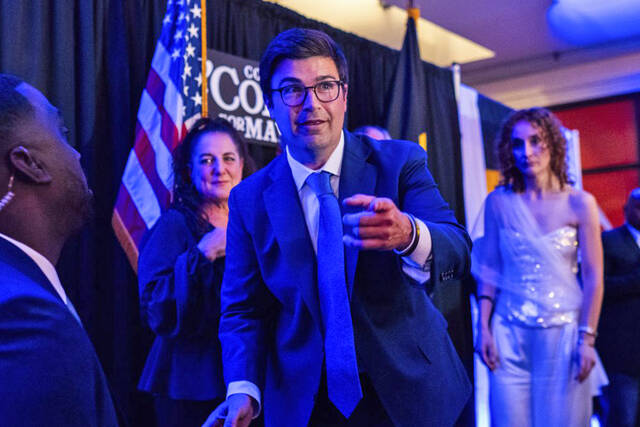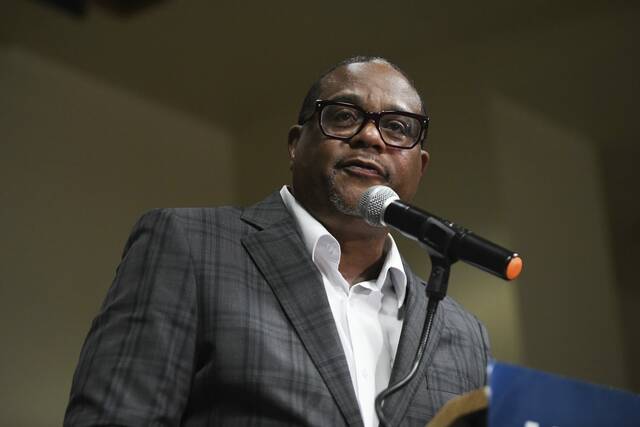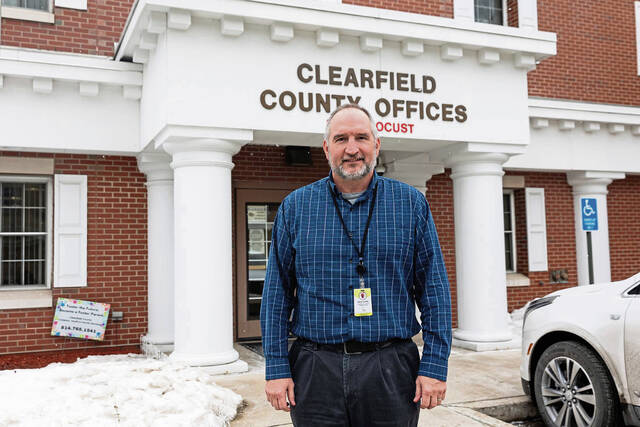Corey O’Connor first toyed with the idea of trying to unseat Pittsburgh Mayor Ed Gainey about a year ago.
In his role as Allegheny County controller, he often talked to residents throughout the city — and what he heard was frustration.
People complained about safety, development and basic services, O’Connor told TribLive Wednesday morning, fresh from defeating Gainey the night before in the Democratic primary.
Experts analyzing O’Connor’s win credited his ability to capitalize on voter discontent.
“I think it’s fair to say this race was mostly about the incumbent mayor’s performance — and people certainly judged it to be lacking,” said Berwood Yost, who oversees polling for Franklin & Marshall College.
O’Connor’s campaign motto — Pittsburgh deserves better — reflected what would become the heart of his message. His campaign was based on convincing people he’d do a better job than Gainey.
“This is an opportunity where, given my background and experience, we can build a good team to take Pittsburgh in a different direction,” O’Connor told TribLive. “That was how we saw this race. Pittsburgh’s going this way. I think we can get it back on track.”
A golden ticket
The city faces fiscal challenges. Federal covid-19 relief money is drying up, Downtown real estate values are plummeting and a lucrative tax on out-of-town professional athletes is being challenged in court.
O’Connor has pointed to instability in the police bureau, an aging and underfunded vehicle fleet and a spending plan some believe to be unrealistic as examples of problems under Gainey’s leadership.
Though Gainey’s campaign has pushed back on criticisms from detractors about the mayor’s competence and highlight his wins in his first three years in office — like securing the 2026 NFL Draft, launching a revitalization effort Downtown and decreasing homicides — it seems voters didn’t believe he’d done enough.
And that gave O’Connor the golden ticket to a healthy primary win.
“It usually takes the incumbent opening the door in some ways for a challenger,” said Chris Borick, a political science professor at Muhlenburg College.
“It’s pretty rare to have a fairly popular incumbent get beaten by even a well-financed challenger. So the incumbent has to have some cracks that could be exploited. In this case, I think there were significant cracks in the mayor’s public standing that ultimately were exploited.”
Councilwoman Theresa Kail-Smith, D-West End, supported O’Connor. She said if voters were expecting revolutionary changes from Gainey, it wasn’t fair to expect him to move mountains in just three years.
“However, when you’re waiting for a home, you’re waiting for a street to be paved, you’re repeatedly having issues and you’re constantly seeing trash and graffiti in your neighborhood, it becomes too heavy of a burden for people to bear, and three years is too much for them,” said Kail-Smith.
Name recognition
Still, political experts said the person in office has the advantage. Voters are more likely to know who they are, and incumbents can campaign on any wins they’ve notched in that position already. People who are generally content with the way things are going will be apt to vote for the current occupant of city hall.
“It is more of the incumbent’s to lose because the incumbency is such an advantage,” Borick said. “When they lose, it has to be a significant part on them. That doesn’t mean the challenger is not important. Certainly, you have to offer something, and you have to be able to run a campaign that gets your name out there.”
Councilman Anthony Coghill, D-Beechview, a vocal O’Connor backer, said that’s what he saw play out in Pittsburgh.
He believes O’Connor’s focus on making basic improvements — like reining in unnecessary spending, fostering stability in the police bureau and improving simple services like paving or plowing roads — resonated with Pittsburghers.
Coghill said O’Connor “saw the city needs saving” and pitched himself to voters as a transparent, experienced leader who could guide it in the right direction.
“If Gainey had been doing a good job — or even just an average job — I don’t think Corey would’ve challenged him,” Coghill said.
The name recognition part of the campaign was undoubtedly easy for O’Connor. The son of the late Mayor Bob O’Connor, a popular figure who himself had been a longtime City Council member, O’Connor previously sat on council. In his role as county controller, he serves as a fiscal watchdog.
Alison Dagnes, a political science professor at Shippensburg University, said voters who disliked Gainey may have been more easily swayed to cast their ballots for O’Connor because he’s well-known.
“That’s an easier lever to pull in the ballot booth, because you know somebody,” Dagnes said. “You’re not just voting against someone.”
Gainey’s campaign manager, campaign spokesperson and campaign chair did not respond to requests for comment Wednesday.
‘No regrets’
Councilwoman Barb Warwick, D-Greenfield, who stands firmly in Gainey’s camp, blamed a “relentless misinformation campaign by conservative media” for contributing to the mayor’s loss.
“It can be hard to communicate successes to the public, and maybe that’s an area the administration could’ve done better,” Warwick said. “But I think the media and the unfair negative press played a role.”
Warwick said she believes Gainey’s lasting legacy will be a positive one, punctuated by a reduction in homicides and a significant expansion of the Office of Community Health and Safety.
“I think Mayor Gainey has just been an astonishingly good mayor, and also being Pittsburgh’s first Black mayor really meant a lot to a lot of people,” Warwick said.
“I think it’s a big loss for Pittsburgh for him not to be able to go on and continue the fantastic work that he started — but I hope the incoming administration will pick up where he left off and continue that work.”
Gainey Tuesday night told supporters he was proud of what he had done.
“Let me tell you what you’ve helped to build. You showed this whole city what it means to have a city for all: young, old, Black, white, Latino, Palestinian and Jews, Christian and Muslim,” the mayor said. “Right here in this room.”
Gainey said it’s been a wonderful four years.
“There ain’t no regrets,” he said. “There’s progress.
“Don’t be defeated. Don’t be sad. Be glad of the progress the we made.”
Afterward, in speaking to reporters, Gainey said he didn’t think anything went wrong in the race.
“He ran the campaign the way he felt he had to run it to win. I make certain decisions. Negative ads, and the things that he wanted to run, that’s on that campaign,” Gainey said. “That’s just not me.
“What I’m going to do is tell the truth and let my record speak for itself.”
Pleasing the public
Throughout the contentious lead-up to the primary, Gainey often tried to cast his opponent as a “MAGA” Republican sympathizer. He lambasted O’Connor for taking donations from Republicans, sidestepping the fact he’d done the same, and portrayed himself as the man best suited to stand up to President Donald Trump.
That doesn’t seem to have been a winning strategy, Borick said.
“In local races, the performance, the ability to govern, of an incumbent, is crucial. If the public’s not pleased, all the framing of the campaign in terms of big national politics is not going to win the day,” Borick said. “It’s certainly not a slam-dunk way to win a race on a Democratic primary.”
Voters were more concerned about whether their streets would be paved than about whether someone took money from a Republican, said Councilman Bobby Wilson, D-North Side, who endorsed O’Connor.
“It’s about putting real wins on the board,” Wilson said. “At the very basic level, people want their services. They want to hear improvements to city services more than they want to hear messaging that’s obscure to them about how we’re going to fight national politics on a local level.”
O’Connor’s victory marked the second consecutive time in which Pittsburghers have ousted a sitting mayor.
Gainey defeated then-Mayor Bill Peduto in the Democratic primary in 2021. People wanted change then, too, said Sam Hens-Greco, who heads the Allegheny County Democratic Committee.
Four years ago, that push for change benefited Gainey, who swept into office as the city’s first Black mayor, vowing to make Pittsburgh a city where everyone could thrive.
He spent the last three years focused on bolstering the city’s supply of affordable housing, elevating diverse leaders on Grant Street and improving bridge maintenance after the Fern Hollow Bridge collapsed into Frick Park shortly after he took office.
But Gainey’s administration faced setbacks, and his campaign saw divisions among elected leaders, unions and community groups ahead of the primary.
Two police chiefs resigned amid controversy just months apart. The mayor’s communications director left in a similar fashion last year and has not been permanently replaced. His chief of staff departed with little explanation.
Gainey has been unable to deliver on his campaign promise to make the city’s major nonprofits “pay their fair share.” The city’s police bureau continues to lose officers to retirement and resignation faster than it can recruit new them. And the city is already outspending its overtime projections for public safety and public works.
Samuel Chen, principal director at political consulting firm The Liddel Group, said he felt Gainey needed to do more to address the problems his administration had faced, like controversies over a revolving door of police chiefs.
“I don’t feel like Gainey got ahead of his negatives very well. Gainey seemed almost flippant about it, like this is a non-issue,” Chen said. “Voters aren’t fooled. They know it’s a real issue. What happens is you look indifferent. It feels very unserious and lazy, and people see through that.”
Referendum on Gainey
With most precincts reporting by Wednesday afternoon, O’Connor had secured nearly 53% of the votes counted against Gainey’s 47%.
“It is a referendum on the incumbent,” Hens-Greco said. “You’re asking for change. If you’re comfortable with the status quo, if you like what’s going on, you’re going to keep the incumbent.”
Hens-Greco credited O’Connor for launching a well-organized campaign and for his ability to articulate specific problems he saw — along with potential solutions.
Hens-Greco said he didn’t necessarily think the Gainey campaign had done anything that especially hurt their chances.
But broader factors put Gainey in a tough spot from the start, Franklin & Marshall’s Yost said.
Gainey took over as the world was still reeling from a pandemic that emptied offices and hurt the city’s finances. He had to deal with the long-term ramifications of a Downtown now struggling to fill empty office space and declining property tax revenues from the once-bustling skyscrapers that had been a key source of funding for the city.
The mayor inherited a police bureau that was already understaffed and a vehicle fleet already several years older, on average, than would be considered best practice.
The Democratic Party suffered significant losses in the November general election, leaving people dissatisfied with the party as a whole. That intraparty division could also be hurting some incumbent Democratic leaders like Gainey, Yost said.
“If the context were a little different, perhaps the race would’ve been a little different,” Yost said.
O’Connor credited his success also on the emphasis his campaign placed on reaching voters directly. He estimated his campaign knocked on about 20,000 doors between February and the May 20 primary.
“I think that really set a tone that we’re not taking this lightly,” O’Connor said, and allowed his campaign to connect with voters in a more personal approach than television ads and mailers.
That sort of human touch often resonates deeply with voters, Dagnes said.
“If you can show you’re a real person,” she said, “voters gravitate towards that.”
Staff writer Paula Reed Ward contributed to this report.













